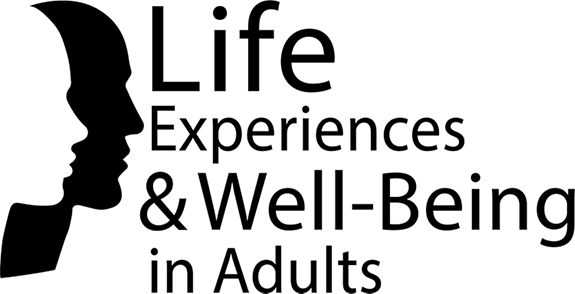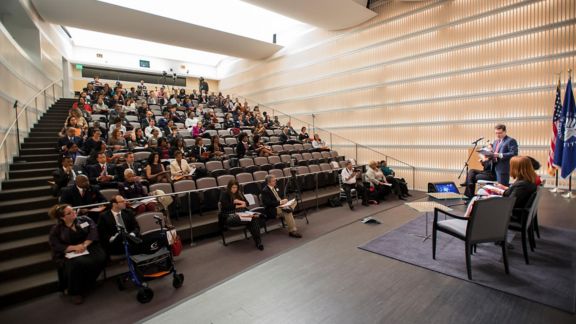Life Experiences and Well-Being in Adults Study

Thank you for your interest in the study!
This study is being conducted by researchers at the University of Illinois at Chicago (UIC) and NORC at the University of Chicago. The researchers are Judith A. Richman, Ph.D., and Kathleen Rospenda, Ph.D., from the UIC Department of Psychiatry, and Timothy Johnson, Ph.D., from NORC at the University of Chicago and the UIC Department of Public Administration.
We received funding from the National Institutes of Health to study life experiences and well-being among adults aged 40 to 60. The study will look at various experiences, such as unemployment, other job situations, living situations, health benefits, physical and mental health, and use of health care services.
Please see below for some frequently asked questions about this study. If you have other questions not answered here, or would like more information, you may contact us in the following ways:
- For questions about completing the survey or technical issues with the web questionnaire or incentive payments, please contact the NORC at the University of Chicago project team at (877) 777-4982 or wellbeing@norc.org.
- To talk to the researchers who are conducting the study, please contact Dr. Judy Richman at (312) 413-4527 or jrichman@uic.edu, or Dr. Kathleen Rospenda at (312) 413-4528 or rospenda@uic.edu.
- For concerns about the study or questions about your rights as a research participant, please call the UIC Office for the Protection of Research Subjects (OPRS) toll-free at (866) 789-6215, or email uicirb@uic.edu.

Project Investigator
Are You a Study Participant?
Questions about the survey? Experiencing technical difficulties? Contact us:
Related Tags
FAQ
More Information about the Study
Your household was randomly selected for this study from the U.S. Postal Service Delivery File, and you were identified as the person in the study’s age range. We are contacting you now because you participated in a similar survey in 2022. In addition to the $5 to thank you for your time, after you return the survey this year, you will receive $25 as further thanks for contributing to this important research. However, the decision to participate is completely voluntary. This is the final survey for this study, so you will not be contacted again to participate after this year.
This study is about how life experiences, including religious and spiritual activities, social relationships, and the economy affect people’s physical and mental health including alcohol and drug use. We also want to learn how people feel about these experiences and whether people can access and use health and mental health services.
If you’d like to know more about the study before you decide whether or not to participate, you can e-mail or call Dr. Richman at jrichman@uic.edu or 312-413-4527, or Dr. Rospenda at rospenda@uic.edu or 312-413-4528.
This is the third and final year that we will contact you to complete a questionnaire. Each survey can be done online or in pencil and paper format. Each survey will ask questions about the same topics, and you can decide for each survey whether or not you want to participate at that time.
This study is funded by the National Institutes of Health, which is a U.S. federal agency.
Should I take this survey?
In this study, we hope to learn about the experiences that people in your age group are having throughout the country. To represent the many different experiences that people are having, it is important to hear from as many people as possible who were randomly selected for this study. We hope that you will choose to participate in this study and help us learn about the type of experiences that affect people’s well-being, and the types of things that may help people deal with stress.
Each survey will take about 30-40 minutes to complete.
You will be paid $30 if you complete this third and final survey.
Being in this study will not benefit you personally. Taking part in this study may help other people in the future by suggesting ways to improve the economy, how government works, and health or mental health care services. Study results may suggest ways to change social policies to better promote the well-being of Americans.
Potential risks include discomfort about answering questions that some people consider to be sensitive (such as questions about problems with work or living conditions, health status, or use of alcohol or drugs). Another possible risk is a breach of privacy and/or confidentiality. These risks are small because we train project staff and use technical means to protect your data privacy. Also, you can skip any questions that make you uncomfortable.
Our study team members are available to talk to you about your experiences or reactions to the study and can provide information about where to go if you need help dealing with stress, depression, anxiety, or use of alcohol or drugs. There is also a very minor risk that disclosing illegal substance use may have legal implications if someone outside of the study was able to identify you. This is very unlikely given the steps we take to protect confidentiality of the data.
Confidentiality
We are concerned about confidentiality and data privacy, too. Your answers to survey questions will be matched with a number instead of your name. Any identifying information (like e-mail address, phone number, or address) is removed and kept in a separate file before reporting any results of the study. All reports, research papers, or presentations based on the findings will present data combined from many people – they will never identify specific people. If you are completing the survey online, online privacy can never be fully guaranteed, but we will protect your privacy and confidentiality to the extent that it is technologically possible. The study is also covered by a Certificate of Confidentiality from the National Institutes of Health to help protect your privacy.
The Certificate of Confidentiality is a type of protection given to the research from the U.S. National Institutes of Health (NIH). The Certificate protects the researchers on this study from being forced to tell people that are not connected with this study about your participation in the research, even under a court order.
However, we are required to report information about suspected or known abuse of a child or elder, or emergency situations involving potential harm to yourself or others. If any member of the research team is given such information, he or she may disclose this information to the appropriate authorities. Because this research is sponsored by the NIH, staff from that or other Department of Health and Human Services (DHHS) agencies or the University of Illinois Office for Protection of Research Subjects may review records that identify you, strictly for audit or program evaluation. They too will protect your privacy. They can’t report anything that would harm the people who participate in this research. This Certificate, however, does not imply that DHHS approves or disapproves of this study.
How will the survey data be used?
If you would like a summary of results from this study, please contact Dr. Richman at jrichman@uic.edu or 312-413-4527 or contact Dr. Rospenda at rospenda@uic.edu or 312-413-4528. (If you would like a printed copy mailed to you, please include your postal mail address in the message.)
If you’d like to talk to the researchers about your experiences, or if you’d like a referral for help dealing with stressful experiences, please contact Dr. Richman at jrichman@uic.edu or 312-413-4527, or Dr. Rospenda at rospenda@uic.edu or 312-413-4528.
If you need immediate help with stress or with thoughts of self-harm, please call or text 988 to reach the 988 Suicide & Crisis Lifeline. You can also contact this helpline via online chat at https://988lifeline.org/chat.
You can also reach a free, 24/7, confidential text message service for people in crisis. Text HOME to 741741 in the United States.
Your answers will be combined with the answers from all others participating in the study, and the overall results will be written up in journal articles, research reports, and presentations. The findings will be presented only in combined form – they will never identify specific people. The results will help the researchers suggest ways to decrease stress, and suggest ways that people might best cope with different kinds of stress in their lives to protect their long-term health.
In addition, the National Institutes of Health require us to submit data to a national data archive (NDA) once personally identifiable information is removed so that other researchers may use it. Once the data are submitted, they cannot be withdrawn from future use. However, you may decide now or later that you do not want your study data added to the NDA. If you do decide that, you can contact Dr. Richman at jrichman@uic.edu or 312-413-4527 or Dr. Rospenda at rospenda@uic.edu or 312-413-4528.
The researchers and staff who work on this project may see your data, but remember that your answers will not be linked to your name or other identifying information.








